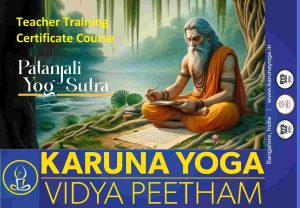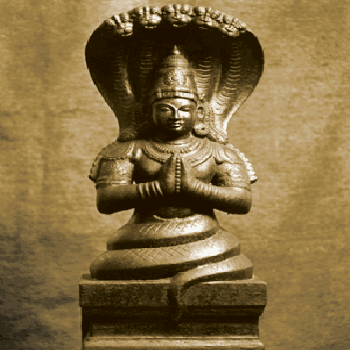Course: 20 Hrs Ashtanga Yoga Sutra Philosophy & Chanting Certificate Course (Yoga Alliance YACEP Certification)
Duration: 20 Hrs 
Fee: INR 40,000 (non-refundable) advance towards the course fee.
Accreditation: Yoga Alliance YACEP Certification
Language: English Medium.
Self-Paced/Flexible Duration: Online or Regular Mode.
Course Dates: Please Contact Us (karunaayoga@gmail.com or +91 9686549129)
Introduction
Yoga is a whole life process. There is actually only one Yoga, with various aspects The most known and extremely useful aspect of this one Yoga is the eight rungs (ashta=eight, anga=limbs) outlined by Patanjali in the Yoga Sutras.
The intent of this course is to provide a very practical, yet thorough overview of the systematic process of traditional Ashtanga Yoga. Our approach is essentially three-fold: First, the most essential foundation principles are introduced and explained. Second, the eight rungs (ashtanga) are each explained. Third, explanations are given on what to do with the eight rungs in conjunction with those foundation principles. This journey includes practical principles on the outcomes of the practices, and the levels of direct experience that come as a result of practicing traditional Ashtanga Yoga. The course is meant for a wide range of practitioners, including those who are new to Yoga, and those with years of experience who wish to explore the subtler, more interior aspects of Yoga.
We are passionate about these principles and practices and offer these to you from the depth of our hearts. May your Ashtanga Yoga practices bring you peace, happiness, and bliss.
In loving service.

What you’ll learn ?
- Have an excellent understanding of the principles of traditional Ashtanga Yoga.
- Have a solid foundation in practicing historical Ashtanga Yoga.
- Ashta means “eight” and anga means “rungs” or “limbs”. Ashtanga refers to the 8 rungs of Yoga as outlined in the Yoga Sutras.
- Yoga Ethics.
- The goal of Ashtanga Yoga is kaivalya, or liberation from, or transcendence of mental conditionings, not physical fitness as in modern devolutions of yoga.
- Ashtanga Yoga leads to direct experience of the eternal center of pure consciousness called Atman or Purusha.
Requirements
- No specific materials are needed for the course
- Materials will be provided in the Resources throughout the course.
To Whom this course for:
- This course is for anyone with interest in Yoga
- The ideal student would have an active curiosity and a genuine interest in practicing the subtler aspect of traditional Ashtanga Yoga.
Course Content
- Introduction to Ashtanga Yoga
- Introduction to Ashtanga Yoga
- Meaning of “Astha” and “Anga”
- Hatha Yoga: Preparation for Ashtanga Yoga
- Ashtanga Yoga Resources
- Foundation Principles for the Eight Rungs
- Anushasanam: Discipline (1.1)
- Nirodhah: Setting Aside all the Aspects of Mind (1.2)
- Vrittis: Fluctuations in the Mind-Field (1.2)
- Drashtuh: Experiencing the ‘Seer’ (1.3)
- Convergence of Experience, Reasoning, and Validation (1.7)
- Asevitah: Practice with Assiduous Awareness (1.14)
- Abhyasa and Vairagya: Practice and Non-attachment (1.12-1.16)
- Antarayah: The Natural Obstacles (1.30-1.32)
- Stabilizing the Mind (1.33-1.39)
- Questions about the Foundation Principles
- Descriptions of the Eight Rungs8 lectures
1) Five Yamas: Relationship Training (2.30-2.39)
2) Five Niyamas: Individualized Training (2.32-2.45)
3) Asana: Sitting Posture (2.46-2.48)
4) Pranayama: Four Energies of Prana (2.49-2.53)
5) Pratyahara: Withdrawal of Senses (2.54-2.55)
6) Dharana: Concentration (3.1)
7) Dhyana: Meditation (3.2)
8) Samadhi: Absorption of Attention (3.3)
What to do with the Eight Rungs14 lectures
Samyama: Combination of Rungs 6, 7, & 8 (3.4)
Kleshas: Coloring and Uncoloring (2.3-2.9)
Avidya: Getting past Ignorance (2.3-2.5)
Karmasheya: the Field of Samskaras (2.12)
Viveka: The Reason for the Eight Rungs (2.26-2.28)
Bhumisu Viniyogah: Exploring all Inner Levels (3.6)
Pratipaksha: Cultivating the Contrary (2.33)
Samprajnata and Asamprajnata: Form and Formless (1.17-1.18)
Parinamah: Three Kinds of Transitions (3.9-3.16)
Kaivalya: The Goal of the Yoga (3.56 / 4.34)
Dhyana & Vichara: Meditation & Contemplation
